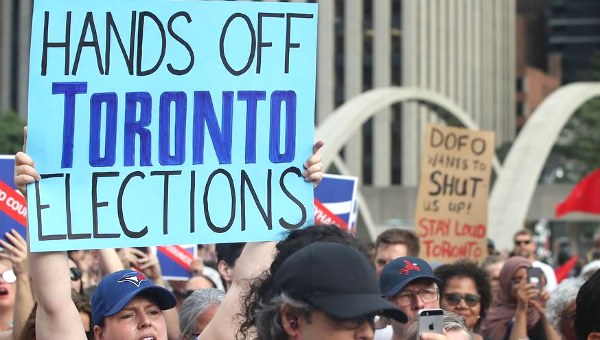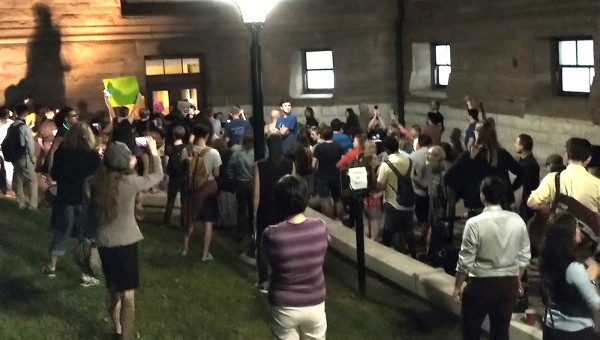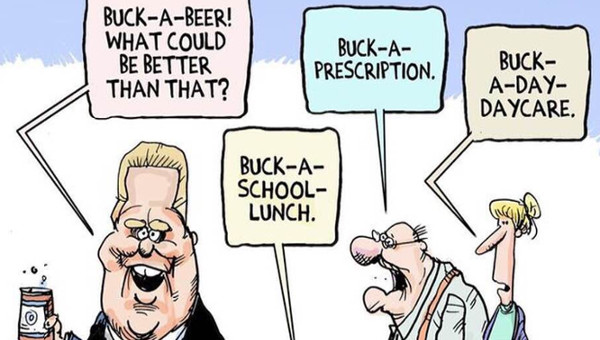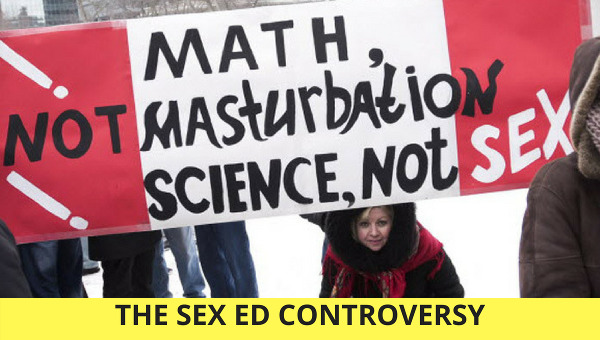Demeaning Democracy: Turning Doug Ford’s Attack on Toronto into a Movement for Democratic Renewal
An Open Letter About Bill 5 Better Local Government Act
We, the undersigned group of scholars and teachers, deplore the autocratic and arbitrary reduction of ward representation for Toronto city council contained in Bill 5 being rushed through the Ontario Legislature by the just-elected Doug Ford-led Conservative provincial government.
 There are numerous problems with this initiative – both in terms of policy and process – that cannot be squared with democratic values or procedures.
There are numerous problems with this initiative – both in terms of policy and process – that cannot be squared with democratic values or procedures.
As policy, reducing the number of city councilors will not make for better representation or government or cost reductions for the city, as the Ford government claims. Indeed, as we saw with a similar cynical reduction of MPPs by a previous Conservative government, reducing the number of politicians did not lead to any cost savings, but merely shifted where money was spent in a poor and half-hearted attempt to respond to constituent demands, and had the effect of weakening local influence and centralizing more power at Queen’s Park and the Premier’s Office.
As policy, reducing the number of city councilors will weaken the democratic representation and advocacy roles so crucial to local government. Fewer wards mean that many more people will be trying to get the attention of fewer politicians. Far from increasing accountability, this will have the effect of insulating politicians from public pressure as bigger wards mean increased costs to run for office and politicians that will be indebted to those who can fund their campaigns. Meanwhile, local citizens will find it much harder to organize a grassroots campaign in these larger wards.
As policy, reducing the number of city councilors will make it harder to have a council that truly reflects the economic and social diversity of the city, as all research on representation shows that winner take all voting systems combined with large riding sizes tend to benefit the most established and powerful groups in society (i.e. wealthy white males) and fail to reflect the class, gender, ethnic and racial diversity of the community.
As process, it is conventional to signal the desirability of such reforms in the campaign period for provincial office, rather than announcing it after the election when voters now have no ability to consider it in casting their vote.
As process, it is conventional to take input on such proposed changes from the institutional representatives and voters that will be affected by the changes and develop an interactive policy approach that operates on realistic timelines to gain, respond, and act on such input, rather than ram through arbitrary changes just months before they need to be put into practice.
As process, it is conventional for governments elected under the first-past-the-post electoral system, particularly those that have gained a majority of seats but only a minority of the popular vote, to act with caution in taking up divisive policy issues, especially when such issues touch on the democratic rules of the game themselves. To radically alter the representational structure of another level of government, without warning and without input from said government or its electorate, is clearly an abuse of the power that the first-past-the-post voting system grants to legislative majority governments.
At this point, it would be fruitless to demand that the Ford Conservative government reverse its actions on this issue as the government has made it clear by its actions and stated public rationales that its ‘reforms’ are, like their ‘austerity’ agenda, ideological in nature, scope and objectives and, as such, not subject to reasoned, informed, evidence-based discussion or deliberation or non-partisan considerations of the public good or fair play. As with conservative movements across western countries, the point of such efforts is to weaken the already shallow substance of democratic representation, deliberation and accountability in favour of strengthening the power of those with substantial wealth.
However, armed with evidence-based insights about these attacks on democracy at both the procedural and institutional levels, we can recommend specific political reforms to help reverse and prevent such undemocratic initiatives in the future. As such we call on citizens, organized groups in civil society, and the key Ontario opposition parties to support the introduction of the following reforms:
1. The immediate introduction of a proportional voting system for provincial elections. The results of the 2018 Ontario provincial election and the subsequent actions by the Ford Conservative government demonstrate clearly why the first-past-the-post voting system is a danger to the survival of democracy itself. Conservative governments are increasingly demonstrating their willingness to abuse the democratic trust that is required for FPTP to operate. With just 40% of the popular vote, the Ford Conservatives are pushing through a host of policies that a majority of Ontarians clearly oppose, and they are doing so in a manner that prevents that opposition from organizing and bringing pressure to bear on the government. The opposition parties in Ontario should declare their commitment now to introduce PR after the next election, if they are elected.
2. The establishment of a legitimate public consultative process to determine the proper levels of representation for the city of Toronto, as well as other reforms of governance (like the introduction of a proportional voting system for the city), with a commitment by the provincial government to act on them.
3. A removal of the ban on political parties or slates running for municipal office in Toronto. As research clearly demonstrates that an absence of organized groups at the local level is the key barrier to people running for and participating in local politics, this politically-motivated restriction should be repealed.
4. Establish a Citizens’ Assembly to rethink the role and purpose of local government, including ways to rebalance the influence between the provincial and local levels, and between property developers, ratepayers and tenants. •
Endorsed by:
- Nadia Abu-Zahra, Associate Professor International Development University of Ottawa
- Christo Aivalis, SSHRC Postdoctoral Fellow, Department of History, University of Toronto
- Patricia Albanese, Professor, Dept of Sociology, Ryerson University
- Ahmed Allahwala, Associate Professor, Teaching Stream, Department of Human Geography, UTSC
- Sabah Alnaseri, Associate Professor, Department of Politics, York
- Miriam Anderson, Associate Professor, Department of Politics and Public Administration, Ryerson University
- Caroline Andrew, Centre on Governance, University of Ottawa
- Sedef Arat-Koc, Associate Professor, Department of Politics and Public Administration, Ryerson University
- Hugh Armstrong, Professor Emeritus, Carleton University
- Ian Balfour, Professor, Dept. of English, York University
- Rachel Barken, SSHRC Postdoctoral Fellow, Department of Sociology, York University
- Deborah Barndt, Professor Emerita, York University
- Tim Bartkiw, Associate Professor, Ted Rogers School of Management, Ryerson University
- Ranu Basu, Associate Professor, Geography, York University
- Shyon Baumann, University of Toronto
- Ray Bazowski, Associate Professor, Department of Politics, York
- William Bedford, PhD Candidate, FES, York University
- Andrew Biro, Professor, Department of Politics, Acadia University
- Simon Black, Assistant Professor of Labour Studies, Brock University
- Niko Block, author and Graduate Studies, Department of Politics, York University
- Nicholas Blomley, Professor of Geography, Simon Fraser University
- Larry S. Bourne FRSC FCIP, Professor emeritus, University of Toronto
- Susan Braedley, Associate Professor, School of Social Work, Carleton
- Linda Briskin, Professor Emeritus, Social Science Department York University
- Deborah Brock, Associate Professor, Department of Sociology, York University
- Susannah Bunce, Associate Professor, Department of Human Geography, University of Toronto Scarborough
- Bill Burns Adjunct Faculty Graduate Studies, York University
- Nergis Canefe, Associate Professor, Department of Politics and the School of Public Policy, York
- John Carlaw, Graduate Research Fellow, Centre for Refugee Studies, York University
- Jenny Carson, Associate Professor, Department of History, Ryerson University
- Jon Caulfield, Senior Scholar, Urban Studies Program, York University
- Chris Chapman, Associate Professor, School of Social Work, York University
- Soma Chatterjee, Assistant Professor, School of Social Work, York University
- Cara Chellew, Research Administrator, Major Collaborative Research Project Global Suburbanisms, York University
- Sheila Colla, Assistant Professor, Faculty of Environmental Studies, York
- George Comninel, Associate Professor, Department of Politics, York
- Creighton Connolly, Postdoctoral fellow, National University of Singapore
- Rosemary J. Coombe, Senior Canada Research Chair in Law, Communication and Culture, York University
- Matt Corbeil PhD Candidate York University
- Deborah Cowen, Professor, Department of Geography & Planning, University of Toronto
- Cathy Crowe, Distinguished Visiting Practitioner, Department of Politics and Public Administration, Ryerson University
- Simon Dalby, Professor, School of International Policy and Governance, Wilfrid Laurier University
- David B. Dewitt, Professor, Department of Politics, York
- Don Dippo, Professor, Faculty of Education, York University
- Stephan Dobson, Contract Faculty, Dept. of Social Science, York University
- Daniel Drache, Professor Emeritus, Department of Politics, York
- Lisa Drummond, Associate Professor, Urban Studies, Dept of Social Science, York University
- Robert J. Drummond, Professor Emeritus, Department of Politics, York
- Geneviève A. Dumas, Professor Emerita, Department of Mechanical and Materials Engineering, Queen’s University
- Michael Ekers, Assistant Professor, Department of Human Geography, University of Toronto, Scarborough
- Theresa Enright, Assistant Professor, Department of Political Science, University of Toronto
- Lorna Erwin, Associate Professor, Sociology, York University
- Fay Faraday, Assistant Professor, Osgoode Hall Law School, York
- Steven Farber, Assistant Professor, University of Toronto, Scarborough
- Dena Farsad, PhD Candidate, York University
- Leesa Fawcett, Professor, Faculty of Environmental Studies, York University
- Jennifer Foster, Associate Professor, York University
- Liette Gilbert, Professor, Faculty of Environmental Studies, York University
- Sam Gindin Graduate Faculty York University
- Jill Glessing, Continuing Education, Ryerson University
- Luin Goldring, Professor, Sociology, York University
- Kanishka Goonewardena, Associate Professor, Department of Geography and Planning, University of Toronto
- John Greyson, video/filmmaker, Toronto
- Sean Grisdale, PhD Student in the Geography Department at the University of Toronto
- Shubhra Gururani, Associate Professor, Department of Anthropology, York University
- Oded Haas, PhD Candidate, York University
- Ratiba Hadj-Moussa, Professor, Department of Sociology, York University
- Laam Hae, Associate Professor, Department of Politics, York
- Paul A. Hamel, Professor, Faculty of Medicine, University of Toronto
- Pierre Hamel, Sociology, University of Montreal
- Rebecca Hall, Assistant Professor, Development Studies, Queen’s University
- Bob Hanke Adjunct Faculty Department of Communication Studies York University
- Judy Hellman, Professor Emerita, Departments of Social Science and Politics, York
- Stephen Hellman, Professor Emeritus, Department of Politics, York
- Jordan House, Phd Candidate, Department of Politics, York University
- Johanna Householder, Professor, Faculty of Art, OCAD University
- Jennifer Hyndman, Professor and Director, Centre for Refugees Studies, York University
- Susan Ingram, Associate Professor, Dept of Humanities, York University
- Adrian Ivakhiv, Steven Rubenstein Professor of Environment and Natural Resources, University of Vermont
- Les Jacobs, Professor, Department of Social Science, York
- William Jenkins, Associate Professor, Geography, York University
- Josee Johnston, University of Toronto
- Ilan Kapoor, Professor, Faculty of Environmental Studies, York University
- Ali Kazimi, Associate Professor, Department of Cinema & Media Arts, York University
- Matthew Kellway, PhD candidate, Department of Politics, York University
- Ryan Kelpin, PhD candidate, Department of Politics, York University
- Azam Khatam, PhD., Instructor at York University, Disaster and Emergency Management program
- Loren King, Associate Professor of Political Science, Wilfrid Laurier University
- Stefan Kipfer, Associate Professor, Faculty of Environmental Studies, York University
- Margaret Kohn, University of Toronto
- Abidin Kusno, Professor, Environmental Studies, York University
- Hannes Lacher, Associate Professor, Department of Politics, York
- Danielle Landry Lecturer, School of Disability Studies, Ryerson University
- Robert Latham, Professor, Department of Politics, York
- Nicole Latulippe, Assistant Professor, University of Toronto Scarborough
- Ute Lehrer, Professor, Faculty of Environmental Studies, York University
- Nina Levitt, Associate Professor, Department of Visual Art & Art History
- Steven Logan, University of Toronto Mississauga
- Brenda Longfellow, Associate Professor, Department of Cinema and Media Arts, York University
- Stephen Longstaff, Professor Emeritus, Sociology, York University
- Meg Luxton, Professor, Women’s Studies, York University
- Lucy Lynch, Project Coordinator, MCRI Global Suburbanisms, York University
- Margaret MacDonald, Associate Professor, Department of Anthropology, York University
- Sara Macdonald, Phd candidate, Utrecht University
- Heather MacRae, Associate Professor, Department of Politics, York
- Rianne Mahon, CIGI Chair and Professor, Balsillie School of International Affairs and Department of Political Science, Wilfrid Laurier University
- Stephen Mak, Architect, Toronto
- Loren March, PhD Candidate, Department of Geography and Planning, University of Toronto
- Judith Marshall, Research Associate, CERLAC, York University
- Carlota McAllister, Associate Professor, Anthropology, York University
- Eleanor MacDonald, Associate Professor, Department of Political Studies, Queen’s University
- Kenneth Iain MacDonald, Dept of Geography and Program in Planning, Centre for Diaspora and Transnational Studies, University of Toronto
- Jc Elijah Madayag-Bawuah, Graduate Student, Department of Social Science, York University
- Terry Maley, Associate Professor, Department of Politics, York
- Raul Mangrau, PhD candidate, Department of Politics, York University
- Susan McGrath C.M., Professor Emerita, York University
- Wendy McKeen, Associate Professor, School of Social Work, York University
- Paul Christopher Gray, Assistant Professor, Department of Labour Studies, Brock University
- Tanner Mirrlees, Associate Professor, UOIT
- Radhika Mongia, Associate Professor, Department of Sociology, York University
- Colin Mooers, professor, Dept of Politics and Public Administration, Ryerson University
- Esteve Morera, Associate Professor, Departments of Philosophy and Politics, York
- Allan Moscovitch, Professor Emeritus, Carleton University
- Alex Murray, Professor Emeritus, Faculty of Environmental Studies, York University
- Karen Murray, Associate Professor and Democratic Administration Program Coordinator, Department of Politics, York University
- Lisa Myers, Assistant Lecturer, Faculty of Environmental Studies, York University
- Natasha Myers, Associate Professor, Department of Anthropology, York University
- Judith Nagata, Professor Emerita of Anthropology and Asian Studies, York University
- Nicole Neverson, Associate Professor, Sociology Ryerson University
- Glen Norcliffe, Professor Emeritus, Geography, York University
- Liisa L. North, Professor Emeritus, Department of Politics, York
- Hadley Obodiac, Filmmaker, Toronto
- Kris Olds, Professor, Department of Geography, University of Wisconsin-Madison
- Umut Ozsu, Associate Professor, Department of Law, Carleton University
- Laurence Packer, FRES, Distinguished Research Professor, York University
- Simon Parker, Co-Director, Centre for Urban Research, University of York, UK.
- Leo Panitch, Professor Emeritus, Department of Politics, York
- Melanie Panitch, Associate Professor, School of Child and Youth Care, Ryerson
- Daniel J. Paré, Associate Professor, Department of Communication, University of Ottawa
- Jessica Parish, Visiting Scholar, City Institute York University & Research Associate, Lancaster House Publishing
- Justin Paulson, Associate Professor, Department Sociology and Anthropology and Institute of Political Economy, Carleton
- Linda Peake, Director, The City Institute at York University
- Peter Penz, Professor Emeritus, Faculty of Environmental Studies, York University
- Ellie Perkins, Professor, Faculty of Environmental Studies, York University
- Camilla Perrone, Associate Professor of Urban and Regional Planning, University of Florence, Italy
- Frederick Peters, City Institute at York University
- Jay Pitter, Author, Placemaker, Lecturer
- Scott Prudham, Professor, Department of Geography and Planning, School of the Environment, University of Toronto
- John Radford, Emeritus Professor, Department of Geography, York University
- Tracey Raney, Associate Professor, Department of Politics and Public Administration, Ryerson University
- Katharine N Rankin, Professor, Geography and Planning, University of Toronto
- Veronika Reichert, Teaching Assistant, PhD Student, Department of Politics York University
- Markus Reisenleitner, Professor, Department of Humanities, York University
- Mahmud Rezaei, Assistant Professor, Architect & Urban Designer, Visiting Scholar, the City Institute at York University
- Richard Roman, Professor Emeritus, University of Toronto
- Herman Rosenfeld Retiree Education Department UNIFOR
- Stephanie Ross, Associate Professor, School of Labour Studies, York
- E. Natalie Rothman, Associate Professor and Associate Chair, Historical and Cultural Studies, University of Toronto Scarborough
- Sue Ruddick, Professor, Geography and Planning, University of Toronto
- Parastou Saberi, Postdoctoral Fellow, Department of Geography, Vrije Universiteit Brussel
- Lake Sagaris, Investigador y Profesor Asociado Adjunto, Pontificia Universidad Catolica de Chile
- Anders Sandberg, Professor, Environmental Studies, York University
- Richard Saunders, Associate Professor, Department of Politics, York
- Rebecca Schein, Human Rights/Interdisciplinary Studies, Carleton University
- Dayna Nadine Scott, York Research Chair in Environmental Law & Justice in the Green Economy
- Jo Sharma; Associate Professor, University of Toronto Scarborough
- John Shields, Professor Dept. of Politics and Public Administration Ryerson University
- Tyler Shipley, Professor of Culture, Society and Commerce, Department of Liberal Studies, Humber College
- Joel Shore, Professor of Biology, York University.
- Myer Siemiatycki, Professor, Department of Politics & Public Administration, Ryerson University
- Brian C.J. Singer, Dept. of Sociology, Glendon, York University
- David Skinner, Associate Professor, Department of Communication Studies, York University
- Charles Smith, Associate Professor, Department of Political Studies, University Saskatchewan
- André Sorensen, Professor, Department of Human Geography, University of Toronto Scarborough
- Luisa Sotomayor, PhD, Assistant Lecturer, Faculty of Environmental Studies, York University
- Elaine Stavro, Associate Professor, Department of Political Studies, Trent
- Arne S. Steinforth, Department of Anthropology, York
- Lindsay Stephens, Course Instructor, Department of Geography and Planning, University of Toronto, Scarborough
- Andrew Stevens, Associate Professor, Faculty of Business Administration, University of Regina
- Donald Swartz, Professor Emeritus, School of Public Policy and Administration, Carleton
- Richard Swift Author and Educator Canadian Dimension
- Zack Taylor, Director, Centre for Urban Policy and Local Governance, University of Western Ontario
- Roza Tchoukaleyska, Assistant Professor, Environmental Studies, Memorial University of Newfoundland
- Sam Tecle, PhD candidate, Sociology, York University
- Mark Thomas, Associate Professor, Sociology, York University
- Neil Thomlinson, Politics and Public Administration, Ryerson
- Stefan Treffers, PhD Candidate, Department of Sociology, York University
- Eric Tucker, Professor, Osgoode Hall Law School, York
- Steven Tufts, Associate Professor, Geography, York University
- Ethel Tungohan, Assistant Professor, Department of Politics, York
- Murat Ucoglu, Phd candidate, FES, York University
- Peter Vandergeest, Professor, Geography, York University
- Krys Verrall Adjunct Faculty Department of Humanities York University
- Peter A. Victor Emeritus Professor, York University
- Ron Vogel, Professor, Department of Politics and Public Administration. Ryerson University
- David Wachsmuth, Canada Research Chair in Urban Governance, McGill University
- Sarah Wakefield, Associate Professor, Department of Geography and Planning, University of Toronto
- Alan Walks, Associate Professor, Department of Geography, University of Toronto – Mississauga
- John Warkentin, Professor Emeritus, Geography, York University
- Traci Warkentin, Assistant Lecturer, Faculty of Environmental Studies, York University
- James Watson, PhD candidate, Department of Sociology, McMaster
- Elizabeth Watters, Lecturer, School of Social Work, York University
- Christopher Webb, PhD Candidate, Department of Geography and Planning, University of Toronto
- Reg Whitaker, Professor Emeritus, Department of Politics, York
- Daphne Winland, Associate Professor, Department of Anthropology, York University
- Patricia Wood, Professor, Department of Geography, York University
- Jenny Wüstenberg, Assistant Professor, Department of Politics, York
- B.H. Yael, Professor, Integrate Media, Faculty of Art, OCAD University
- Douglas Young, Associate Professor, Dept of Social Science, York University
- Kathy L. Young, Professor, Geography, York U
- Anna Zalik, Associate Professor, Faculty of Environmental Studies, York University





